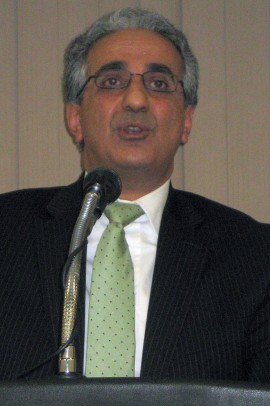Youth, technology inspire change, Egypt’s consul general says

Egyptian consul general Maged Refaat Aboulmagd speaks for the Allan Lerner Foreign Affairs Series. Photo: Katharine Floros
By Salwa Shameem
When Egyptian Consul General Maged Refaat Aboulmagd joined the foreign service in 1988, the world was completely different.
“The dissemination of information and connectivity of the communities in the world has dramatically changed,” Aboulmagd said during an Allan Learner Foreign Affairs Series talk March 14 in Student Center East.
Increased access to technology and the effects of globalization were central to Egyptian resistance during the recent Arab Spring movement, Aboulmagd said.
The Internet was introduced to Egyptian masses in early 2000 and saw a rapid increase in usage by 2010.
“It has changed interaction and the way any citizen in the world perceives his country — it certainly did for Egyptian youth,” he said.
Despite being an old country in terms of its traditions and history, Egypt is demographically young, Aboulmagd said.
Aboulmagd believes that young people played an indelible role in the disintegration of Hosni Mubarak’s regime during the Arab Spring movement.
“The young people of Egypt were never organized and they were not able to reach the upper echelons of power, but for the first time it was the youth who were able to bring Mubarak to trial,” he said.
Phillip Maciaszek, a junior in psychology, found Aboulmagd’s vision of youth creating change particularly
inspiring.
“His speech solidified my desire to join the world of foreign affairs,” he said.
Maciaszek, who plans to join the Peace Corps after graduation, hopes to transition into the foreign service after his Peace Corps commitment.
“The consul general’s emphasis on the importance of young citizens in both Egypt and around the globe enriched all of us and our role in the world today.”
shameem1@uic.edu
• Salwa Shameem is a senior in political science.
